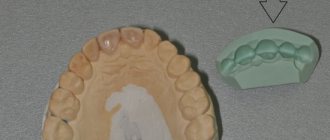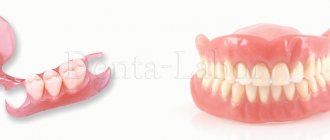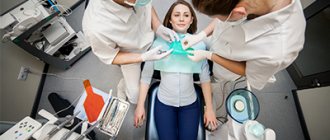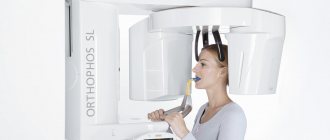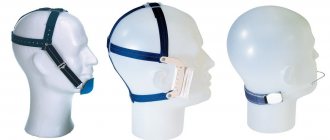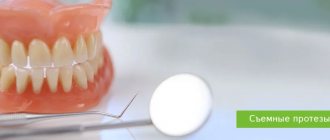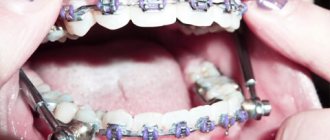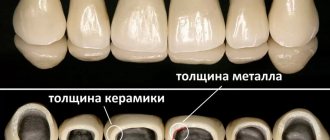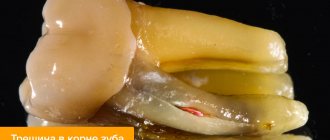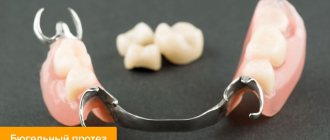Almost all patients of orthopedic dentists experience difficulties after prosthetics. In the first few days, sometimes weeks, the discomfort is quite noticeable, since there is a foreign object in the oral cavity. But the adaptation period can be made easier if you ask your dentist in advance how to quickly get used to removable dentures. Experts have developed several recommendations that will help you go through the period of adaptation to orthopedic structures with less difficulty.
Dry mouth or increased salivation
A feeling of dryness or, on the contrary, increased salivation occurs due to the adaptation of the mucous membranes to a foreign body. If the design is made correctly, the discomfort quickly passes. If your mouth is dry, you should drink water more often and rinse, but do not use alcohol solutions. It is worth limiting the consumption of tea, coffee, and at least temporarily giving up smoking. You need to get rid of dryness quickly, otherwise your gums will be injured.
Excessive salivation is a reaction to a foreign body in the mouth, to constant contact with the mucous membrane. It goes away on its own in a few days. You can simplify the adaptation process for the mucous membrane by rinsing with decoctions of chamomile, oak bark or sage, or solutions recommended by your doctor.
What else affects inflammation when wearing dentures?
Firstly, the state of the oral microflora is influenced by the material from which the prosthesis is made. Maximum adhesion of microorganisms is observed when wearing plastic prostheses. When such a structure is in the mouth for a week, 20 new species of bacteria appear in the microflora, many of which are pathogenic.
Secondly, the influence of the prosthesis on the composition of the microflora of the oral cavity is largely determined by the quality of its manufacture and installation.
How to reduce the negative impact of a prosthesis on microflora?
To reduce the negative impact of dentures on the microflora of the oral cavity, it is important for the patient to be as attentive as possible to the daily care of new teeth. For competent and effective daily hygiene you will need:
- preventive toothbrush with a multi-level brush field;
- therapeutic and prophylactic toothpaste of medium or low abrasiveness with mild anti-inflammatory and astringent properties;
- therapeutic and prophylactic rinses with extracts of herbs and plants, anti-caries, antimicrobial, anti-inflammatory, astringent and deodorizing properties;
- flosses for cleaning interdental spaces or any spaces covered with artificial crowns;
- irrigators for massaging gums in “shower” mode and cleaning the rinsing gap.
If chafing occurs while wearing dentures, try using two unique products - ASEPTA FRESH mouth rinse and ASEPTA PARODONTAL gum gel with propolis.
Gel for gums with propolis "ASEPTA®" is made based on the waste product of bees.
- Natural propolis (10%) in the product provides action in 4 directions: antimicrobial, anti-inflammatory, healing, and reduces pain.
- The gel base allows you to apply the product directly to the inflamed area for a targeted effect.
A product for daily oral hygiene, ASEPTA FRESH rinse, has a unique combination of xylitol and potassium citrate, which reduces tooth sensitivity and protects tooth enamel from the negative effects of acids and bacteria. The mouthwash provides comprehensive oral care due to a carefully selected composition of plant extracts and microelements.
The effectiveness and safety of ASEPTA products has been confirmed by numerous clinical studies conducted at the Central Research Institute of Dentistry and Maxillofacial Surgery.
What adorns a person better than any furs and diamonds? Of course, a beautiful healthy smile. But how can you maintain the natural whiteness of your teeth and the health of your gums if every day they are subjected to “tests” in the form of coffee, unhealthy diet, inattentive care and poor ecology? Of course, seek professional oral care. Today we will talk about what this concept hides and what this type of care includes.
Problems with diction
After prosthetics, there is less space in the mouth, which is why the patient may have problems with diction at first: the tongue does not have enough free space, sounds are distorted. To cope with this faster, you will need training. To do this, you can read aloud, pronounce individual complex sounds, and do tongue exercises. The more actively the tongue “works” immediately after prosthetics, the faster the adaptation will take place and normal diction will be restored. When getting used to speaking correctly, you need to make sure that when pronouncing sounds, saliva does not fly from your mouth. A good workout would be tongue twisters that are spoken slowly, making sure that the pronunciation and articulation are correct.
Contraindications to professional cleaning
Like any health procedure, professional oral care has its contraindications. You should not agree to brush your teeth if you have the following diseases:
- mucosal injuries;
- hepatitis B and C, HIV, AIDS;
- poor blood clotting;
- pathologies of the respiratory system;
- allergy to fluoride-containing drugs;
- any serious diseases of internal organs;
- diseases of teeth and gums in the acute phase.
Eating
Chewing skills with a newly installed denture need to be developed gradually. This does not mean that you need to switch to broths, purees and cereals. On the contrary, you need training with a gradual increase in load. The hardness of the products is increased gradually. It is better to start eating vegetables and fruits in small pieces, chewing them thoroughly. They get used to biting food in the same way - gradually, starting with softer foods and moving on to hard foods. You need to chew and bite carefully: it is important not to damage or injure the gums, and to control the load on it.
After installing a removable denture, the patient may feel that food is deprived of its usual taste, it has become less pronounced. This occurs because the base of the structure covers the palate where the tactile receptors are located. This does not affect the perception of taste in any way - taste buds are located on the tongue. The feeling that the taste of food has changed is associated with a foreign body in the mouth and quickly passes as you get used to it.
Do you have questions about removable dentures?
We will call you back within 30 seconds
+7
Injuries
In the first days after installation, injured areas may appear on the surface of the gums: small wounds, abrasions, etc. They may appear due to improper chewing technique or sensitivity of the mucous membrane. Normally, the denture stops rubbing the gums within a few days. You can speed up this process by rinsing with antiseptic solutions and chamomile decoction.
If injuries do not go away over time, become more pronounced, or cause increasing discomfort, you should consult a doctor. The problem may lie in the design itself. The doctor will conduct an examination and correct the prosthesis. Usually one correction is enough for the discomfort to go away.
Consequences of loose dentures
Failure to see a doctor in a timely manner to correct the problem can cause serious complications that become more noticeable to others:
- Rubbing and injury to periodontal tissues, leading to inflammatory processes and periodontitis;
- discomfort while eating;
- distorted speech;
- change in facial proportions;
- Gastrointestinal diseases associated with poor chewing of food.
In addition, delaying a visit to the dentist can provoke the appearance of purulent abscesses, which subsequently require surgical intervention.
Allergic reaction
It occurs very rarely, since all structural elements are made of hypoallergenic, biocompatible materials. It manifests itself as redness of the gums at the contact site; this area may itch and possibly burn. The unpleasant sensations do not go away and do not weaken, they can intensify, the gums look injured.
Allergy is a rejection of construction materials, which may be accompanied by nausea, malaise, and dizziness. It appears almost immediately after installation, disappears after some time if you remove it. There is no point in waiting for adaptation in case of allergies - the reaction will only intensify over time. To solve the problem, you need to find out which material in the structure you are allergic to and make a new prosthesis without using it.
Psychological aspect
Often the use of a prosthesis provokes psychological discomfort in the patient: it frightens him, it seems to him that complications have already arisen, and adaptation is not going well. To prevent such a problem from arising, you need the right attitude: a person must be prepared for the difficulties that may arise in the first days. It is important to take your time and understand that the body needs to get used to new conditions. The period of complete adaptation takes up to one and a half months on average, but the most noticeable discomfort disappears after 1-2 weeks if you wear the prosthesis constantly.
To get used to a removable denture faster, orthodontists at the Dentospas clinic recommend massaging the gums. You can do it yourself, it will improve blood circulation and tissue nutrition, and improve the condition of the gums. Massage is done provided that the surface of the mucous membrane is not injured and there are no open wounds on it. At first, to speed up adaptation, you can leave the prosthesis on at night (install it again after cleaning). This is safe (the gums and tongue hardly move during sleep) and allows you to increase the time of contact of the mucous membrane with the base of the structure.
Options for getting out of the current situation
The problem is resolved on an individual basis, taking into account the client’s personal wishes and financial capabilities. Corrective methods include: relining the structure, replacing components, implanting dentures, manufacturing a more advanced structure. Magnetic fixation, adjustment or replacement of fixation mechanisms are also often used.
An important point is that after 3-5 years, even the most expensive products need replacement or adjustment. Timely replacement is the right solution for those who want to have a wonderful smile without huge financial costs.
Recommendations for use
| Click to sign up for a FREE consultation |
The service life of each product directly depends on the source materials, operating conditions and variety. Thus, the service life of an acrylic structure is about 5 years, clasp systems - up to 10 years.
An important aspect is the storage of the prosthesis. It is recommended to store rubber products in water at night, as this prevents their deformation; more modern acrylic and nylon prostheses do not need to be removed at all (if you want to take a break from the prosthesis, the structure can be removed, cleaned and placed in a special case). If you have not worn a removable denture for a long time, it should be treated with an antiseptic before installation.
The main rule for long-term use of a removable denture is regular visits to the doctor. Don't forget to visit the dentist at least once a year.
